Leveraging private sector strengths to overcome crises - lessons from Türkiye and beyond

The UNDRR ARISE Private Sector Alliance for Disaster Resilient Societies co-organized an event called 'Businesses on the Frontlines of Crises: Lessons Learned from Türkiye and Beyond' as part of the Humanitarian Networks and Partnerships Weeks in Geneva. The event was kicked off with opening remarks by Sarah Wade-Apicella, Head of the Partnerships & Stakeholder Engagement Unit, who spoke on behalf of Paola Albrito, Director of the United Nations Office for Disaster Risk Reduction (UNDRR). During the event, the Sendai Framework for Disaster Risk Reduction was discussed at length as it provides a roadmap to reduce disaster losses by 2030 and highlights the shared responsibility of all stakeholders, including businesses, in building more resilient societies.
In preparation towards the adoption of a Political Declaration for the Midterm Review of the Sendai Framework by UN Member States, the event was a timely opportunity to emphasize the importance of private sector involvement in disaster risk reduction and share insights from past crises. At the event, it was discussed that private sector engagement, experience, and leadership are crucial to making progress across all of the Sendai Framework's four priorities. These priorities include understanding risk in all its facets, strengthening governance to manage disaster risk, investing in resilience, and enhancing disaster preparedness for effective response to 'Build Back Better'. The conversation was beneficial, especially in light of the recent earthquakes in Türkiye and Syria, which highlight the importance of private sector involvement in preventing new risks and reducing existing risks.
Can UN organisations and private businesses work together to better respond to disasters in the world? Here’s what @AJRodriguezUN, from the @UN, and @elisamtrujillo, from #CENACED and @arisemx, said at the panel organised by @swissinfo_en and @Connecting_biz pic.twitter.com/I1VXKntdOg
— swissinfo.ch (@swissinfo_en) April 28, 2023
Business representatives emphasized the significance of collaborating during crises and highlighted the private sector's role as a crucial partner. The International Service of the Swiss Broadcasting Corporation highlighted the remarks from Elisa Trujillo, Director-General of the National Support Center for Epidemiological Contingencies and Disasters (CENACED) and ARISE Mexico, on the importance of having a better narrative and developing a common language among different institutions so that the technical expertise from the private sector can be leveraged and actions are not taken in isolation. Additionally, as reported by the Connecting Business Initiative (CBi), Kit Miyamoto, founder and CEO of Miyamoto International and ARISE member, noted the shared responsibility of key actors for enforcing adequate procurement procedures. Examples of private sector involvement after the earthquake in Türkiye were showcased.
UNDRR strongly advocated for an all-of-society approach, which includes the private and public sectors, civil society, and local communities. To achieve this, all stakeholders must commit resources, knowledge, and experience into building a resilient and sustainable future and shift their mindset from a short-term perspective towards a “Think Resilience” long-term approach in all forms of private and public sector investments.
Overall, the event was successful in promoting the importance of disaster risk reduction and the involvement of businesses and stakeholders in achieving this goal.
The event was co-organized with the United Nations Office for the Coordination of Humanitarian Affairs (OCHA) and the United Nations Children Fund (UNICEF) with moderation by Virginie Mangin from media partner SWI swissinfo.ch.